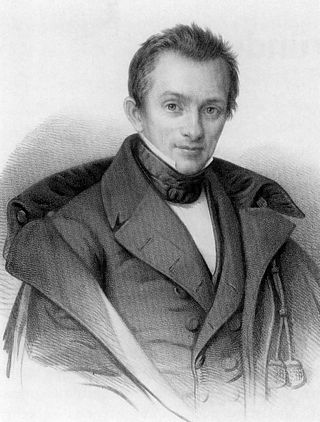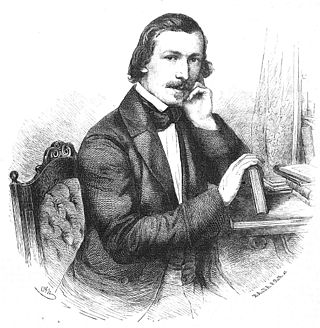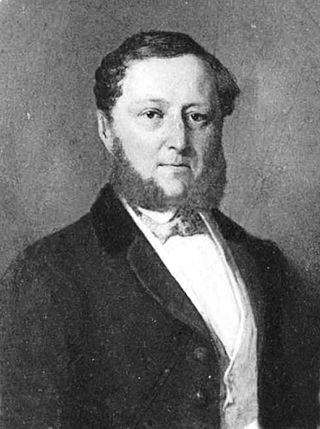
Karl Heinrich Emil Koch was a German botanist. He is best known for his botanical explorations in the Caucasus region, including northeast Turkey. Most of his collections have today been lost. He is also known as the first professional horticultural officer in Germany.
Felix Liebrecht was a German folklorist.

Arnold Duckwitz was a German statesman and merchant who served as Minister of Trade and of the Navy in the provisional government of the Frankfurt Assembly of 1848–49, and as mayor of Bremen.

Freiherr Ernst Merck was a German businessman and politician.
Christian Ludolf Wienbarg was a German journalist and literary critic, one of the founders of the Young Germany movement during the Vormärz period.
Gottlob Friedrich Walter Agathon Wunderlich was a German jurist and a member of the Oberappellationsgericht der vier Freien Städte.

Rochus Wilhelm Traugott Heinrich Ferdinand Freiherr von Liliencron was a Germanist and historian, known for his collection of German Volkslieder, published in five volumes in 1865–1869, and as the editor of the biographical reference work Allgemeine Deutsche Biographie (ADB), published 1875–1912.
Georg Heinrich Ferdinand Nesselmann was a German orientalist, a philologist with interests in Baltic languages, and a mathematics historian.

Franz Schuselka was an Austrian politician and writer.
Rosa Maria Antonetta Paulina Assing was a German lyric poet, prose-writer, educator, translator, and silhouette artist. She was the elder sister of Karl August Varnhagen, sister-in-law of Rahel Levin, wife of David Assing, and mother of Ottilie and Ludmilla Assing. Her friends included Amalie Schoppe, David Veit, and Fanny Tarnow.

Johann Heinrich Bartels was a scholar from Hamburg who became a city senator in 1798. He played a leading role in civic administration during the difficult years of French occupation (1806-1814). In 1820 he was elected Mayor of the city, a position which he occupied for a remarkable three decades.

Karl Gotthelf Lehmann was a German physiological chemist.

Gustav Adolf Schöll was a German art historian, archaeologist and classical philologist.

Otto Eduard Vincenz Ule was a German writer, known for his popularization of natural sciences, and liberal politician. He was the father of botanist Ernst Heinrich Georg Ule (1854–1915) and geographer Wilhelm Ule (1861–1940).

Johann Georg Martin Brückner was a German historian and geographer.

Carl Hermann Merck was one of the leading Hamburg statesmen of the 19th century, holding the office of Syndicus from 1847 until his death in 1880.

Karl Sieveking, born 1 November 1787 in Hamburg, died 30 June 30 1847, was a Syndicus of Hamburg, diplomat, politician, patron of the arts and philanthropist. The four syndics sat in the Senate with the senators and took part in the debates, but had no vote. The office, at that time, was somewhat analogous to that of a cabinet minister. To them were entrusted all important negotiations, and the preparation of every legislative enactment. A syndicus ranked between a mayor and a senator and had the title "Magnificence". Sieveking was one of the most influential figures in Hamburg in the first half of the 19th century. Among the many traces he left behind in his hometown include the Rauhes Haus, the Kunstverein and the former country estate Hammer Park.

Alexis de Chateauneuf was a German architect and city planner from Hamburg.

Franz Hoppé, also Franz Hoppe, was a German actor and operatic baritone.

Johann Anderson was a German lawyer, naturalist, linguist, and writer who became a mayor of Hamburg. He was among the first to write about his travels to Greenland which was published posthumously in 1746 as Nachrichten von Island und Grönland. Anderson was born in Hamburg, the son of a merchant and whaling ship owner Ammon. He studied law at Leipzig from 1694 and then went to Halle and obtained a doctorate from Leiden with a dissertation titled De iuramento Zenoniano. He also became interested in natural history and his acquaintances included Anton van Leeuwenhoek. He returned to Hamburg in 1697 and worked as a lawyer. In 1702 he became a council secretary and became a syndic in 1708. He was involved in a treaty with the British dealing with trade in salted herrings. In 1723 he became mayor of the city of Hamburg and was in the position until his death.















